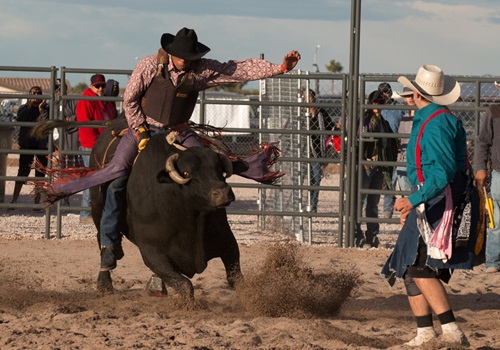
Both photos © Danny Raustadt | Dreamstime.com
In the mid-1800s, Black cowboys accounted for about one-quarter of all cowboys who were part of the ranching movement in the American West. In mainstream narratives, though, their contribution to history often is overlooked.
One of the Black cowboy culture’s lasting legacies, however, is the resurgence of Black rodeos, which “are not only a revival of the past but also educate and inspire future generations about the deep-rooted connection between the Black culture and cowboy traditions,” as BlackEnteprise.com puts it.
“In popular culture, the mélange of Westerns and cowboys and country music that is often called ‘Americana’ has been associated with a particular vision of liberty, in which the people most entitled to the possibilities of the West are white men who mastered the land and its inhabitants,” adds TheAtlantic.com in a story about Oklahoma’s Boley Rodeo — considered the oldest Black rodeo in America, dating back to 1903. “But Boley and its rodeo helped create a countertradition — that of the Black West. In this tradition, Black people who had every reason to give up on America instead struck out for places like Boley and dictated the terms of their belonging.”
That tradition continues today through major Black rodeo organizations like Phoenix-based Black Rodeo USA (which, including partner rodeos such as the Boley Rodeo, has rodeos slated for six states in 2025) and the Fort Worth-Texas based Bill Pickett Rodeo (five rodeos in four states in 2025, plus its own National Finals Rodeo in Upper Marlboro, Md., in September). Additionally, 8 Seconds Rodeo was founded in 2023 as the first Black rodeo in the Pacific Northwest (specifically, Portland, Ore.) and the Okmulgee Roy LeBlanc Invitational Rodeo & Festival in Oklahoma is hailed as one of the largest African-American sporting events in the country.
 “The story of the Black cowboy has never really been lost, but it’s very rarely been told,” Nicole Scott, founder of the Midwest Invitational Rodeo, which is part of the Black Rodeo USA circuit, told AND, a Michigan business publication covering Flint and Genessee County. That rodeo will take place June 13-14 at the Genessee County Fairgrounds. This will be the second year the show has been held in the Greater Flint area; prior to that, it took place at the Wayne County Fairgrounds for seven years.
“The story of the Black cowboy has never really been lost, but it’s very rarely been told,” Nicole Scott, founder of the Midwest Invitational Rodeo, which is part of the Black Rodeo USA circuit, told AND, a Michigan business publication covering Flint and Genessee County. That rodeo will take place June 13-14 at the Genessee County Fairgrounds. This will be the second year the show has been held in the Greater Flint area; prior to that, it took place at the Wayne County Fairgrounds for seven years.
Last year, despite rain, the two-day Midwest Invitational Rodeo attracted 3,000 people and 65 Black cowboys and cowgirls who competed in steer wrestling, bronco riding, barrel racing, roping and bull riding, according to AND. In fact, more tickets than anticipated were sold, and organizers had to bring in more bleachers the week of the rodeo to accommodate all of the spectators.
“This event resonated with me because it aligns with our city’s values of inclusivity, cultural appreciation and economic growth,” Flint Mayor Shelden Neeley told AND. “I was confident that the rodeo would be well received because Flint residents have a deep appreciation for events that bring people together, provide family-friendly entertainment and honor heritage.”
That said, disparities are obvious between Black rodeos and mainstream rodeos.
“While the sport has a lot of passion and energy, there are few resources for Black rodeo athletes,” TravelNoire.com writer Mitti Hicks notes in an April piece about the 8 Second Rodeo. “[8 Seconds founder Ivan] McClellan has witnessed them walking down the street with their horse to get to the rodeo because they don’t have a truck or trailer. He’s seen athletes show up to the rodeo without a horse and borrow someone else’s to compete. As McClellan puts it, they do it by any means because they ‘have a hoof print on their heart,’ and there’s nothing else they would rather be doing. In mainstream rodeos, pro athletes are predominantly white, and it’s not uncommon for them to appear with multiple horses to compete on, especially if they come from ranching families. Many riders also have sponsors.”
There is a pay disparity, too, with Black rodeos often offering prize money ranging from $5,000 to $25,000, compared to hundreds of thousands of dollars awarded at mainstream rodeos.
“We want to infuse this culture with capital, so we can see Black athletes rolling in with seven horses at those pro rodeos and taking home hundreds of thousands of dollars at a time,” McClellan told TravelNoire.com “That’s my vision.”

